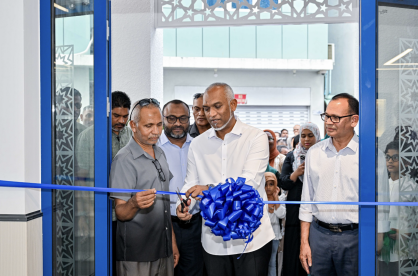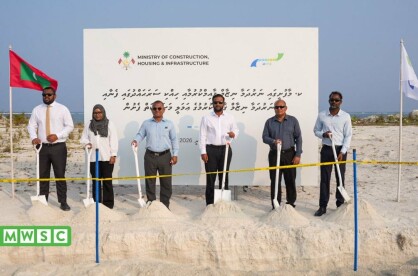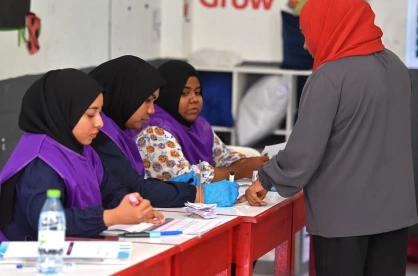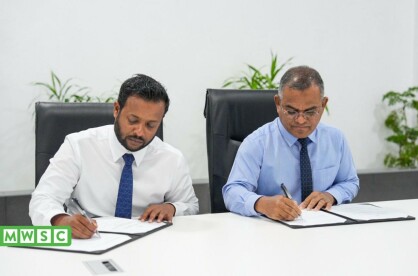Solih gives away 6,200 land plots from Male area sixty days before election
The total value of these 6,200 land plots will be at least MVR 38.7 billion (USD 2.4 billion).

Hulhumale' Phase 2
The total value of these 6,200 land plots will be at least MVR 38.7 billion (USD 2.4 billion).

Hulhumale' Phase 2
The Greater Male' Area in the Maldives has experienced a severe housing crisis, leading to overcrowding that remains unresolved. As landlords capitalize on the situation by charging exorbitant rents, affordable housing options become nearly impossible for ordinary individuals. Many are forced to share apartments and split expenses with family members who earn higher salaries. The introduction of housing development projects in the Maldives has raised hopes for a solution to this crisis.
Since the presidency of Maumoon Abdul Gayoom, housing development projects have been repeatedly promised by political contenders as a means to address the housing crisis. While these projects have benefited thousands of people, a recurring issue has emerged: some individuals take advantage of these projects by obtaining government funded flats and then renting them out at inflated prices, undermining the original purpose of the initiatives.
President Solih has taken a major step, of giving away free land plots from the most expensive Greater Male’ area, just 60 days before the Presidential elections. In an attempt to win votes from the citizens of Male’, Solih chose to ‘bribe’ its residents by giving away more than 6,200 land plots from Hulhumale’, and to be reclaimed land from Gulhifalhu and Giraavaru lagoons. The total value of these 6,200 land plots will be at least MVR 38.7 billion (USD 2.4 billion).
Amid concerns over the economic stability in the Maldives, the publication of the list containing the names of over 15,000 applicants for the ‘free land’ has shattered the hopes of many aspiring landowners. It has revealed that the scheme, touted as a solution to the housing crisis, appears to have served the purpose of consolidating power among the existing ruling elites rather than empowering the wider population.
One significant flaw of the "scheme" is the allocation of free land in the highly scarce and expensive Greater Male' Area. This approach was bound to exacerbate the existing issue of rising rent prices and create an elite group of landlords.
The recipients list of the scheme unveiled an even deeper concern. It revealed that a substantial number of beneficiaries were already heirs to significant land plots, individuals set to inherit their parents' land, owners of multiple flats, as well as certain Members of Parliament, their family members, resort owners, and affluent individuals driven by personal gain.
Compounding the situation further, the list even included a few foreigners who had been granted Maldivian citizenship. This prioritization of foreigners over the struggling local population is particularly disheartening. Every day, countless Maldivians face the dual challenge of finding affordable housing and securing space to establish their businesses. The Greater Male' Area is increasingly plagued by an excess of buildings, leaving inadequate room for citizens to thrive.
These revelations underscore the deep-rooted issues and inequities that have plagued the implementation of the ‘Binveriya’ scheme. While housing schemes are meant to have a vigorous process that eliminates any land owners, inheritors or even apartment owners in order to give the opportunity to those who are most deserving, it appears that the Binveriya scheme has failed to carry out proper evaluation as it is clear that some of the land plots are going to people who already rent multiple homes for millions or run resorts that makes them millions.
As the election draws nearer, the integrity of the Binveriya scheme has come under scrutiny, raising serious concerns about possible corruption. While some argue that errors in the evaluation process may have led to the inclusion of numerous landowners and Members of Parliament (MPs) in the recipient list, a closer examination suggests that these occurrences might be more than mere mistakes and could be perceived as attempts to secure votes for the current administration.
One particularly suspicious aspect is the inclusion of MP Mohammed Nashiz, and his wife MP Rozaina Adam in the list of beneficiaries of free land. Nashiz was the Solih’s campaign manager in the recent primaries of the Maldivian Democratic Party (MDP). It is widely known that MP Nashiz and his wife possess considerable influence and strong political affiliations with the ruling party. Given their existing prominence and affluence, it is questionable why they would require additional land, casting doubt on whether their inclusion was truly an oversight.
Perhaps the most shocking inclusion is that of the former Vice President and Tourism Minister Ahmed Adeeb, and the Managing Director of the Maldives Marketing and Public Relations Corporation (MMPRC), Abdulla Ziyath. Both of them were involved in the largest corruption and one of the largest money laundering schemes in recent history of Maldives, and stole more then USD 78 million from state funds.
While it may not be surprising to see a few MPs taking advantage of a housing scheme, the inclusion of individuals with such extensive connections raises eyebrows and adds to the growing skepticism surrounding the fairness and transparency of the process. The fact that someone with such a tarnished reputation was granted a place on the list only intensifies concerns about the scheme's integrity and raises questions about the vetting process for beneficiaries.
These instances collectively contribute to the perception that the Binveriya scheme may extend beyond administrative errors and potentially involve favoritism or attempts to influence votes in the upcoming election. The inclusion of individuals already possessing considerable wealth, influence, or controversial backgrounds fuels skepticism and calls for a thorough investigation into the decision-making process behind the scheme.
The Binveriya scheme has been subject to criticism, with many arguing that it was flawed from its inception. Providing free land without considering the larger context of the housing crisis and national debt in the Maldives fails to address the underlying issues. Even if the scheme had been implemented with integrity and prioritized those genuinely in need of housing, it would have required substantial financial assistance for the construction of houses. While this might appear daunting, it could still be seen as a justifiable option, considering that many individuals in the Greater Male' Area spend their entire lives paying rent. Obtaining a housing loan could have been a potential solution.
However, when influential and wealthy individuals exploit a housing scheme designed to alleviate the crisis and provide homes for those in need, it raises serious concerns about the integrity, honesty, and transparency of the current administration. The actions of the administration prompt questions about whether their intentions were genuinely aimed at improving the economy and the livelihoods of Maldivians. Instead, it seems that the administration is prioritizing the interests of the wealthy and influential, further exacerbating the challenges faced by ordinary citizens who live from paycheck to paycheck. As a result, the future for regular citizens becomes even more uncertain and daunting.
These observations raise important questions about the true motives behind the Binveriya scheme and highlight the urgent need for the administration to reevaluate its priorities. If the goal is to create a prosperous and equitable future for all Maldivians, it is crucial that the focus shifts towards improving the lives of the majority rather than catering to the interests of the privileged few. The administration must restore faith in its commitment to transparency and ensure that its actions align with the needs and aspirations of the Maldivian people.



